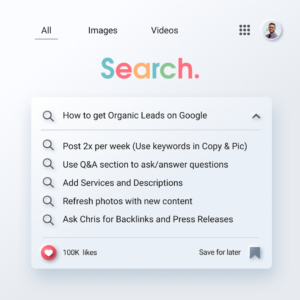Optimize Google Business Profile (Google My Business) Listing
Claim and Verify Your Google Business Listing
To begin your journey in local seo strategies, let’s focus on he easiest way to beat the algorithms. Optimizing your Google My Business (GMB) listing, the first step is to claim and verify it. This ensures that you have control over the information that appears on your business profile. To claim your listing, search for your business on Google Maps or the local search results, and click on the “Claim this business” option. Next, follow the verification process, which typically involves receiving a postcard at your business address or verification via phone or email. Once verified, you can access and manage your GMB listing.
Complete Your Business Profile
With your GMB listing claimed, it’s essential to provide accurate and comprehensive information about your business. This includes filling out all the required fields, such as business name, address, phone number, website URL, and category. Additionally, consider adding optional details like business hours, service areas, and a description of your business. Ensure that all the information you provide is up-to-date and consistent with what appears on your website and other online platforms.
Add High-Quality Photos and Videos
Visual content plays a significant role in attracting potential customers to your local business. Enhance your GMB listing by adding high-quality photos and videos that showcase your products, services, and premises. Make sure to include images of your storefront, interior, team members, and any unique features that set your business apart. Additionally, consider uploading videos that provide an introduction, highlight your offerings, or showcase customer testimonials. Compelling visual content not only helps attract attention but also builds trust and credibility among your target audience.

Utilize Local Keywords in Website Content
Include Local Keywords Naturally
To effectively optimize your website for local SEO, it is crucial to incorporate local keywords naturally into your website content. Local keywords are specific terms or phrases that people in your target location would use to search for businesses like yours. For example, if you own a coffee shop in New York City, some local keywords might include “best coffee shop in NYC,” “coffee shop near Times Square,” or “New York City coffee.”
When writing your website content, ensure that you include these relevant local keywords in a way that feels natural and organic. It’s important not to keyword stuff or overuse these local terms, as search engines may penalize your website for this practice. Instead, focus on creating high-quality, informative content that incorporates these keywords naturally.
Optimize Meta Tags with Local Keywords
Another effective strategy to boost your local SEO efforts is to optimize your meta tags with local keywords. Meta tags, such as the meta title and meta description, are HTML elements that provide information about your webpage to search engines. By including local keywords in these meta tags, you can increase your chances of ranking higher in local search results.
When crafting your meta tags, make sure to include relevant local keywords that accurately describe your products or services. For example, if you own a bakery in Los Angeles, your meta title could be “Delicious Freshly Baked Goods in Los Angeles” and your meta description could provide more details about the types of treats you offer. Remember, each page on your website should have unique meta tags optimized with local keywords to maximize your local SEO potential.
Create Localized Landing Pages
One powerful way to leverage local keywords is by creating localized landing pages for different areas or regions you serve. These landing pages can target specific cities, neighborhoods, or even states where your business operates. By tailoring your content to specific locations, you can cater to the unique needs and interests of local customers.
When creating localized landing pages, ensure that each page contains valuable information about your offerings in that particular area. Include local keywords in the page’s title, headings, content, and meta tags to boost its visibility in relevant local searches. Additionally, consider including testimonials or case studies from satisfied customers in the targeted location, as this can further enhance your credibility and trustworthiness among local audiences.
By utilizing local keywords effectively in your website content, optimizing meta tags, and creating localized landing pages, you can significantly improve your small business’s local SEO performance. These strategies will help you attract more targeted traffic, increase your online visibility within your community, and ultimately drive more customers to your doorstep.

Earn Positive Reviews and Ratings
Encourage Customers to Leave Reviews
Earning positive reviews and ratings from customers is crucial for boosting your local SEO efforts. The more reviews you have, the higher your business appears in search engine results. Encourage your customers to leave reviews by providing excellent products or services and offering exceptional customer service.
Make it easy for customers to leave reviews by creating profiles on popular review platforms such as Google My Business, Yelp, and Facebook. Provide clear instructions on how customers can leave reviews and remind them to do so after they have made a purchase or used your services.
Consider implementing a review generation strategy that involves sending follow-up emails or text messages to customers asking for their feedback. You can also offer incentives, such as discounts or exclusive offers, to customers who leave reviews. This not only encourages positive reviews but also helps to build loyalty and increase repeat business.
Respond to Reviews Promptly
Engaging with customers through reviews is another effective way to earn positive ratings and improve your local SEO. Monitor your online reviews regularly and respond promptly to both positive and negative feedback.
When responding to reviews, thank customers for their positive comments and address any concerns or issues mentioned in negative reviews. Show empathy and provide solutions to problems raised by customers. This demonstrates your commitment to providing excellent customer service and can help to turn a negative experience into a positive one.
Avoid generic or automated responses and personalize your replies to show that you genuinely value your customers’ feedback. Engaging with customers through reviews not only enhances your online reputation but also signals to search engines that your business is active and responsive, which can positively impact your local SEO rankings.
Showcase Your Reviews on Your Website
In addition to generating reviews on external platforms, you should also showcase your positive reviews on your own website. This helps to build trust and credibility with potential customers who visit your site.
Create a dedicated page or section on your website where you can display customer testimonials or reviews. Include the customer’s name, their feedback, and if possible, a photo or video testimonial. Link back to the original review source to demonstrate authenticity.
Consider integrating review widgets or plugins that automatically collect and display reviews from external platforms on your website. This saves you time and effort while providing social proof to visitors.
Regularly updating and showcasing positive reviews on your website not only helps with local SEO but also enhances your overall online presence, making your business more attractive to potential customers.

Local Link Building Strategies
Utilize Local Directories
One effective way to build local links is by utilizing local directories. These directories are online platforms that list businesses within a specific geographical area. Submitting your business information to these directories can help improve your local SEO and increase your online visibility. Look for reputable directories that are relevant to your industry and location, and make sure to provide accurate and up-to-date information about your business.
Partner with Local Businesses
Building partnerships with other local businesses is not only beneficial for networking and collaboration but can also be an effective strategy for local link building. By forming alliances with complementary businesses in your area, you can mutually promote each other’s products or services on your websites. This can include featuring testimonials or reviews, guest posting on each other’s blogs, or even co-hosting events or cross-promotions.
Get Involved in Community Events
Participating in local community events is another way to build local links and demonstrate your commitment to your community. Sponsorship or participation in events such as fundraisers, local charity drives, or festivals can provide opportunities for brand exposure and potential link building. You can reach out to event organizers and offer to sponsor or volunteer, which may lead to mentions or backlinks on event websites or social media platforms. Additionally, documenting your involvement through blog posts or social media updates can generate further engagement and potential inbound links.
Optimize Website for Mobile Users
Make your website mobile-friendly
With the increasing use of smartphones and tablets, it’s essential to optimize your website for mobile users. A mobile-friendly website ensures that your content is presented in a user-friendly way, with easy navigation and responsive design. To make your website mobile-friendly, consider implementing a responsive design that automatically adjusts the layout and formatting based on the user’s device. This will ensure that your website looks great and functions properly on any screen size.
Ensure fast loading times
Mobile users have limited patience when it comes to slow-loading websites. To optimize your website for mobile users, it’s crucial to ensure fast loading times. Slow loading websites not only frustrate users but also negatively impact your search engine rankings. To improve loading times, minimize the use of large images and videos, compress files, and leverage browser caching. By reducing the size of your website files and optimizing their delivery, you can significantly improve the loading speed and provide a seamless experience for your mobile audience.
Simplify navigation and content
When it comes to mobile users, simplicity is key. Mobile screens are smaller, and users are often on the go, looking for quick information. To optimize your website for mobile users, simplify your navigation and content. Use clear and concise headings, organize your content into easily digestible sections, and ensure that important information is easily accessible. Avoid using excessive pop-ups and interstitials, as they can hinder the user experience on mobile devices. By simplifying your website’s navigation and content, you can make it easier for mobile users to find what they need quickly.

